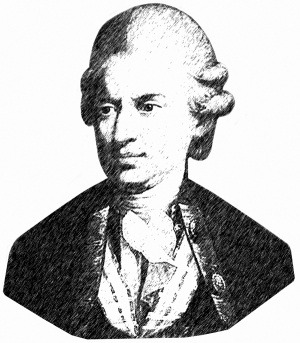
About the Struenseehaus
THE STRUENSEEHAUS MISSION GOES BACK TO ITS FOUNDER
The guiding principle shared by all of the medical teams at Struenseehaus is to provide high-quality outpatient medical care. The cornerstone of this practice is the high levels of medical expertise, the use of the latest treatment and diagnostic methods, and interdisciplinary teamwork. We take into account each patient's particular circumstances and the particularities of each diagnosis as much as possible
A special feature of the Struenseehaus is the extent to which the different medical specialties are integrated in an interdisciplinary manner. This is particularly evident as various teams collaborate to fight malignant tumors, including oncology, laboratory medicine, radiology, and radiotherapy. The close cooperation at the Struenseehaus outpatient center ensures the best treatment possible given the complexity of cancerous diseases
Our namesake J.F. Struensee practiced medicine about 250 years ago as a medical officer in Hamburg-Altona and took decisive steps to improve the quality of medical care in Altona, Hamburg, and Schleswig-Holstein.
Doctor, renaissance man, reformer, and statesman – Dr. J.F. Struensee

| 1737 | Born in Halle, the son of the senior pastor |
| 1751 - 56 | Medical school, move to what was then the Danish city of Altona |
| 1757 - 68 | Served as chief medical officer for Altona |
| 1768 - 70 | Court physician for Danish King Christian VII |
| 1770 - 72 | Secret State Minister and Chancellor of Denmark |
| 1772 | His reform efforts, including the abolition of serfdom and torture, the idea that all citizens were equal before the law, and the introduction of a free press, led to his being denounced as an enemy of the people and publicly executed. He has still not been officially rehabilitated. |
Johann Friedrich Struensee was a man known for his humane attitudes, tolerance, compassion, and passionate advocacy for the sick, the downcast, the disadvantaged, and the outcast. He wrote about social medicine and hygiene and had the chance to realize his ideas once in office. He emphasized the need to avoid contaminating the soil, the water supply, and the atmosphere to prevent what he called "contagious miasma" which unleashed epidemics in humans and animals. As medical officer and then as royal court physician, e fought successfully against scabies, typhus, and smallpox, the "gangrenous quinsy" (diphtheria), typhoid, cholera, and dysentery, "the diseases caused by lust," drunkenness, and ... superstition
He was the first person to describe foot-and-mouth disease in cattle and how to prevent its spread. Struensee founded a rational form of medicine, wrote a book about pharmaceuticals, and drove out unscrupulous quacks and scam artists. He led the vaccination campaign against smallpox in Altona and also in Hamburg, despite resistance from the city's doctors and clergy. The dilapidated orphanage, the Hiobshospital Altona, the insane asylum, and prisons were all targets for his reform efforts. He also established schools for the training of midwives, physicians, and veterinarians. He also set up vaccination clinics.
Struensee reformed the schools and hospitals, converted vacant churches into hospitals, banned the public punishment of unmarried mothers in the pillory, abolished press censorship, beatings, and torture, and made the punishments for criminal activity less harsh. He eliminated serfdom, first in Altona and Holstein, and then across Denmark. He introduced measures to stem the tide of peasants leaving the countryside and banned the slave trade in the Danish colonies.
Struensee proclaimed that every subject was equal before the law and enjoyed the right to free thought. Although his reforms were largely abolished after his execution, Struensee anticipated the ideas of the French Revolution and the German Enlightenment.
Literature about the life of Johann Friedrich Struensee:
Stefan Winkle: Johann Friedrich Struensee. Urban & Fischer, Stuttgart 1989
Paul Barz: Der Leibarzt des Königs. Aufbau-Taschenbuch-Verlag, Berlin 2002
Per Olov Enquist: Der Besuch des Leibarztes. Fischer, Frankfurt 2003
<< Return to Home Page


